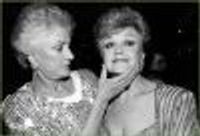What composers were thinking...
#25What writers were thinking...
Posted: 8/13/12 at 5:14amThe Music for Somethings Coming was written by Leonard Bernstein so it isn't really one of Sondheim's most difficult pieces. Sondheim only wrote the lyrics for that song and I don't think the lyrics are particularly difficult compared to some other lyrics Sondheim has written. Now, Buddy's Blues, Getting Married Today and Steps Of The Palace all have much more tricky lyrics just to name a few off the top of my head. I'm not saying Something's Coming isn't a difficult song, I just don't think it's difficulty is attributed to Sondheim.
Gothampc
Broadway Legend Joined: 5/20/03
#26What writers were thinking...
Posted: 8/13/12 at 9:51am
"I've been told that when Stephen Schwartz has been asked about tough songs he has written"
Did you ever take a look at the song "West End Avenue"? And of course there are people that can sing it, but how many tempo changes do you need in one page of music?
#27What writers were thinking...
Posted: 8/13/12 at 9:31pm
Along with "Another Hundred People", "West End Avenue" was in every girl's audition repertoire in the 1970s. As you'd expect, not everyone sang it equally well, but a lot of girls seemed to manage it.
***
I don't know whether this applies to Lloyd Webber, but I have noticed that composers with whom I write tend to jump to very high notes when they are feeling insecure about the composition. It's as if they think letting the singer do acrobatics will hide deficiencies in the writing.
Updated On: 8/13/12 at 09:31 PM
#28What writers were thinking...
Posted: 8/13/12 at 11:41pm
In the case of Adam Guettel, because he is an extremely gifted singer with a remarkable range, he tends to go crazy writing for guys-- at least in MYTHS & HYMNS. I should clarify that I DO think he knows how to write for the voice, particularly because he was a singer in his youth and onward.
#29What writers were thinking...
Posted: 8/14/12 at 12:55am
it's a moot point and i can't remember the source, but sondheim supposedly did contribute some musical elements to the score of west side story. i remember reading an excerpt from a letter leonard bernstein wrote to someone else during their collaboration that credits him specifically with coming up with the complicated tempo for "something's coming". can someone back me up on this? i think it was in a book (real helpful), but it was years ago and i can't for the life of me remember which one.
Updated On: 8/14/12 at 12:55 AM
#30What writers were thinking...
Posted: 8/14/12 at 1:52amI've heard that too--that he helped with the verses, I believe, based on Bernstein's existing chorus. Of course we also know that apparently it was his suggestion to make One Hand, One Heart with (ugh I'm sure I'll say this wrong) dotted half notes, instead of long notes (ie "*make of our hands, one hand*" instead of "one hand, one heart").
kurt.perry41
Stand-by Joined: 11/20/11
#31What writers were thinking...
Posted: 8/14/12 at 1:58amI never have trouble with Bring Him Home. I think it's easier when a Valjean sits on the higher side of tenor so the break is a little higher. and Valjean has a two octave range, he sings multiple low As.
#32What writers were thinking...
Posted: 8/14/12 at 10:25amI performed as Jack in ITW at my community theater and I don't "Giants in the Sky" required much breath control. I found it very easy to sing.
bwaylvsong
Broadway Legend Joined: 7/28/05
#33What writers were thinking...
Posted: 8/14/12 at 11:05am^Different songs are hard for different people.
#34What writers were thinking...
Posted: 8/14/12 at 11:12amGiants in the Sky doesn't really belong in this thread, it's neither difficult to sing or difficult to understand what Sondheim was going for when he upped the words-per-measure quotient for that song: he wanted to write a breathless adolescent who is tripping over himself to relate all the details of a major life-changing event to the audience. It's a nice corollary to the endless run-on sentence Little Red Ridinghood gets trapped in during the middle section of I Know Things Now, and one of the many examples of Sondheim doing the acting for his performers.
michellek45
Leading Actor Joined: 5/20/11
#35What writers were thinking...
Posted: 8/14/12 at 11:59amMaybe it's because I started my musical life as a drummer, but a lot of these songs don't seem as rhythmically complex to me as they do to others. But I guess that makes me wonder- for those who are trained singers, how much rhythmic training do you get? Is there ever a huge focus on staying with a metronome, or is it more making sure you sound good with the music?
#36What writers were thinking...
Posted: 8/19/12 at 10:43am
But I guess that makes me wonder- for those who are trained singers, how much rhythmic training do you get? Is there ever a huge focus on staying with a metronome, or is it more making sure you sound good with the music?
I was vocally trained for 6 years by a professional singer, very popular in the Charlotte, NC area, and she focused A LOT on rythym with me. I don't know if that's how she taught all her students, or if it was just me because when I first started singing I couldn't stay with the music to save my life. I always rushed it. But she would use the metronome ALL THE TIME every time I came to her, which was 3 times a week. By my second year of traing (Yes, it took me a while, don't judge) it was hard to get me OFF beat from the music. It helped me a lot.
#37What writers were thinking...
Posted: 8/19/12 at 11:02am
Amen re: "I Will Prevail".
Consider that KS sang those crazy notes in "Legally Blonde" for almost two years without any noticeable vocal trouble--and then think about how quickly she started having trouble in "Wonderland".
I did read somewhere an interview where she talked about the sound problems on stage. Lots of people blew their voices during "Wonderland"--even rock-solid pros like Karen Mason and Darren Ritchie started to sound tired and sing alternate notes. The sound was good in the house, but the singers couldn't hear themselves. So just about everybody was over-singing and quickly ran into problems.
For their sake, it's probably good that the show didn't run.
#38What writers were thinking...
Posted: 8/19/12 at 6:10pm
As far as brand new shows are concerned, whoever originates the role is who the key is set for. If a vocal freak of nature like Idina Menzel originates a role, they will use her range to its fullest. Colm Wilkinson had the range, so they put it to use in "Bring Him Home".
Changing keys for cast replacements, and in revivals is by no means unheard of, if it doesn't affect the mood of the piece,
#39What writers were thinking...
Posted: 8/19/12 at 6:40pm
TimesSquared, I do know composers who are very sensitive to the relationship of keys in one song to the keys in the songs before and after it. (This is particularly true in classical music (opera), where changing keys to suit a performer is rare.)
Don't get me wrong: *I* can't usually hear the difference, but I know composers who feel very strongly about this.
#40What writers were thinking...
Posted: 8/20/12 at 12:40am
So true, Gaveston. Each key has a distinct personality, and a song that's even just a half-step up or down can convey a very different mood. I'm sure many composers are very particular about the key of a song. An exciting song can sound oddly dead in the "wrong" key. I'll bet ALW is very particular about this. I've never heard a Broadway Eva Peron or Phantom sing in a different key.
I know that in the 10th Anniversary re-casting of Les Miz on Broadway, "Empty Chairs..." was raised to better suit the voice of the new Marius. They loved the actor, so they changed the key. My post may seem to imply that keys are often changed for replacements; they certainly are not, for just ANY role. But I can't imagine Ethel Merman sang Dolly in the same keys as Carol Channing or that every stunt-cast Billy Flynn was required to sing every song in the original keys.
#41What writers were thinking...
Posted: 8/20/12 at 1:05amWell put, TS. I'm sure you're right about the Dollies and Billies.
#42What writers were thinking...
Posted: 8/20/12 at 1:35am
"I KNOOOW RIGHT?! I can't even attempt to sing that!! What, are we supposed to sing Piano in our mixed voice (for a high A)? unrealistic."
I think in my case it's psychological because it doesn't make sense that I could sing higher stuff but when it comes to "Bring Him Home," as soon as I get to "...the summers die one by one, how sooooooon they fly" my voice just says "NO" and doesn't even attempt it. It just doesn't feel right. The few times I've actually tried it, I strained like nobody's business.
Quick story: Several years ago I used to frequent some Karaoke bar in Hollywood. I was determined to do "Bring Him Home" after seeing it listed in their catalog. Their version was the same as one I had purchased a while back but hadn't really ever attempted to sing along to it. I thought the adrenaline of performing in front of a bunch of drunks might *make* me reach notes I always knew I could reach that my voice seemed hesitant to try for whatever reason. So, I got up there and sang it pitch perfect. It was the most amazing feeling ever and all the drunks actually stopped all their chatting to listen and gave me a rapturous applause at the end.
When I got home that night, I put on the cassette of the Karaoke version and found i could sing it easily without the adrenaline. I compared it to the OBC recording and the Karaoke version was significantly lower!!!! AHHHH!!!
Well, so much for that. At least I didn't make a fool out of myself to a bunch of drunks by cracking horribly, lol.
#43What writers were thinking...
Posted: 8/20/12 at 1:43amYeah, Adam Guettel has some crazy-high songs for men (see: "Hero and Leander," most of Fabrizio's vocals in PIAZZA), and even most songs from contemporary composers (Kerrigan/Lowdermilk, Pasek/Paul) are pretty darn high.
#44What writers were thinking...
Posted: 8/20/12 at 2:27am
My Oh My, there's definitely a psychological component to "hitting" high notes. (I used quotes because one of my voice teachers always said "you don't HIT notes, you SING them!")
But I think your problem with "Bring Him Home" even though you've easily sung songs that contained higher notes, is the tessitura of the song, or the frequency of the appearance of those high notes in the song, and the intervals that lead into them. Some songs have intermittent high notes that are easy to jump to from the passages and the notes that precede them. Others, like "Bring Him Home" just sit up there in the stratosphere. You have to hit, (or rather sing) those high notes many times in a row which requires a lot more power than singing the occasional high note after a string of easy ones.
#45What writers were thinking...
Posted: 8/20/12 at 6:38pm
Speaking of psychology, I have one, semi-well-known friend who, I swear, changes the key of everything she sings. No matter the song, it's always a half-step too high or too low.
She is an utter delight to work with in every other way, but she has this thing about keys... My guess is it's part of her way of working into a song.
#46What writers were thinking...
Posted: 8/20/12 at 6:50pmI used to be criticized when I wrote music for women because they all said the same thing, "We don't have your voice" so I was always having to tinker with it to make it right for them. On the new piece I'm working on which centers primarily around two women, one older, one younger I'm working a lot with them and I'm finding it easier.
#47What writers were thinking...
Posted: 8/20/12 at 7:03pm
The film SWEET DREAMS has Jessica Lange as Patsy Cline complaining she "can't sing a man's song", only to be assured they will re-arrange the song for her. She was listening to Willie Nelson's demo of his song, "Crazy".
As we all know, they managed to make it work for Cline, but I wasn't sure what she meant about not being able to sing a man's song. There's nothing in the lyric that refers to gender.
michellek45
Leading Actor Joined: 5/20/11
#48What writers were thinking...
Posted: 8/20/12 at 11:11pmSometimes changing the key a couple of steps will achieve the same vocal effect, but it would make the instrumentals all over the place without re-arranging them. You move it up too much, and what was once a nice, clean trumpet note becomes a shrill one. I could see why composers/arrangers who write complex instrumentations would be cautious to mess with the keys too much.
Videos












